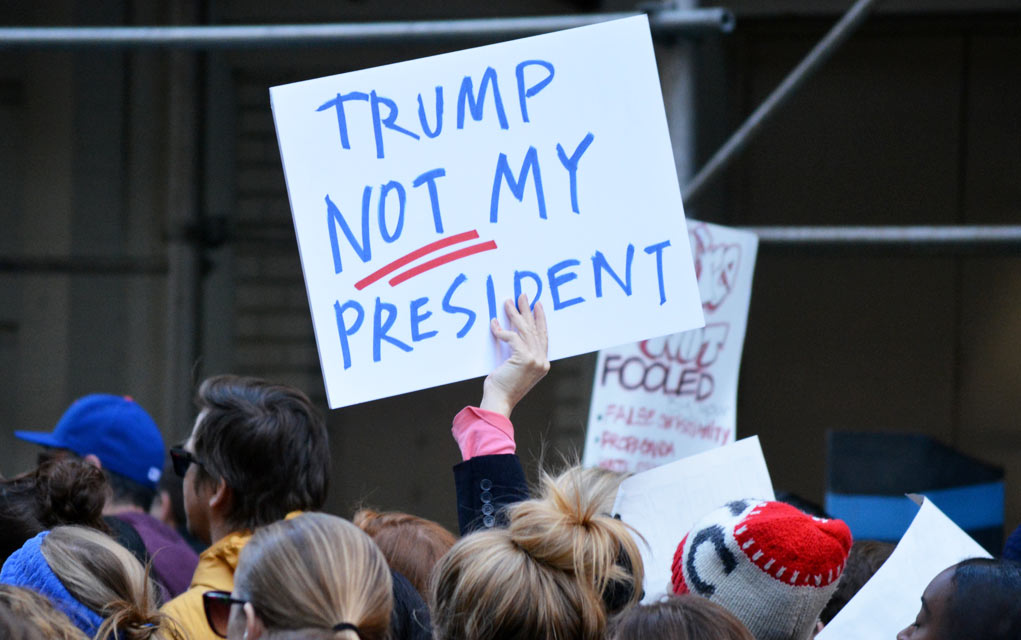Opinion
Opinion: Danger of Historical Amnesia in the Era of Trump

Protester carrying a sign while marching in an anti-Trump rally in New York City in 2016.
By Annie “Q” Sajid
This past President’s Day, many anti-Trump rallies were organized in the name of a “Not My President’s Day.” Ironically enough, the “Not My President” refrain began as a racist chant of the Tea Party to delegitimize Barack Obama’s status as the first Black US president. The framing of Trump as “Not My President” perpetuates the idea that his presidency is an outlier in American history. The backbone of the United States is built on the land theft and murder of Indigenous people and the violent enslavement of Black people. Trump’s win exemplifies the cycles of American history in which any perceived racial progress is inevitably followed by white backlash. To present Trump’s presidency as an unexpected crisis, rather than a byproduct of emboldened American white supremacy, erases this nation’s violent past.
Adrienne Maree Brown insightfully shared in her post-election reflection, “Things are not getting worse, they are getting uncovered. We must hold each other tight and continue to pull back the veil.” While there is a warranted collective anxiety around Trump’s incendiary and dehumanizing political rhetoric, his policies are not fundamentally different from the xenophobic and profit-driven policy agenda of previous presidents. Many liberals forget Obama was dubbed the deporter-in-chief because his administration oversaw the forcible removal of more than 3 million undocumented immigrants and a significant expansion of private for-profit detention centers. Resistance efforts against such inhumane policies were ongoing in the Obama era, but weren’t as visible as they are now.
In the current political moment, we have seen constant direct action, some with deep strategic movement-building such as the collaboration between the Movement for Black Lives and the It Takes Roots Alliance. Others have had a less intersectional understanding of what is at stake, such as the national women’s march which was held accountable for excluding the struggles of women of color, trans women, working-class women, and those whose experiences occupy multiple intersections.
postTo view Trump’s win as the “most volatile” political moment in American history is inaccurate. We are living in volatile and terrifying times, but they are not exceptional political times. We are living in a time of a resurgence and consolidation of power to white supremacist groups. We must vigilantly confront how the evolution of American democracy is not linear.
In Robin D.G. Kelley’s one-year reflection post-Trump, he proposes we move away from “a lack of political imagination beyond crisis recovery and beyond politics as problem management.” We must not just fight back, we must re-imagine and fight for movements that guarantee rights to low-income communities and communities of color including: right to a dignified and stable home, right to accessible and affordable transit, and the right to not just participate in democracy, but democratize power to correct the trajectory of American history.
Among other hats, Annie “Q” Sajid is a communications professional based in Oakland, CA. Currently, she works for Urban Habitat, a policy advocacy organization working to advance equitable policies for low-income communities and communities of color in the Bay Area.
Activism
Oakland Post: Week of November 26 – December 2, 2025
The printed Weekly Edition of the Oakland Post: Week of November 26 – December 2, 2025

To enlarge your view of this issue, use the slider, magnifying glass icon or full page icon in the lower right corner of the browser window.
Activism
Oakland Post: Week of November 19 – 25, 2025
The printed Weekly Edition of the Oakland Post: Week of November 19 – 25, 2025

To enlarge your view of this issue, use the slider, magnifying glass icon or full page icon in the lower right corner of the browser window.
Activism
Oakland Post: Week of November 12 – 18, 2025
The printed Weekly Edition of the Oakland Post: Week of November 12 – 18, 2025

To enlarge your view of this issue, use the slider, magnifying glass icon or full page icon in the lower right corner of the browser window.
-

 Activism4 weeks ago
Activism4 weeks agoOakland Post: Week of November 12 – 18, 2025
-

 Activism3 weeks ago
Activism3 weeks agoIN MEMORIAM: William ‘Bill’ Patterson, 94
-

 Activism4 weeks ago
Activism4 weeks agoHow Charles R. Drew University Navigated More Than $20 Million in Fed Cuts – Still Prioritizing Students and Community Health
-

 Bay Area4 weeks ago
Bay Area4 weeks agoNo Justice in the Justice System
-

 #NNPA BlackPress3 weeks ago
#NNPA BlackPress3 weeks agoLewis Hamilton set to start LAST in Saturday Night’s Las Vegas Grand Prix
-

 #NNPA BlackPress2 weeks ago
#NNPA BlackPress2 weeks agoBeyoncé and Jay-Z make rare public appearance with Lewis Hamilton at Las Vegas Grand Prix
-

 Activism2 weeks ago
Activism2 weeks agoOakland Post: Week of November 19 – 25, 2025
-

 #NNPA BlackPress4 weeks ago
#NNPA BlackPress4 weeks agoThe Perfumed Hand of Hypocrisy: Trump Hosted Former Terror Suspect While America Condemns a Muslim Mayor























































